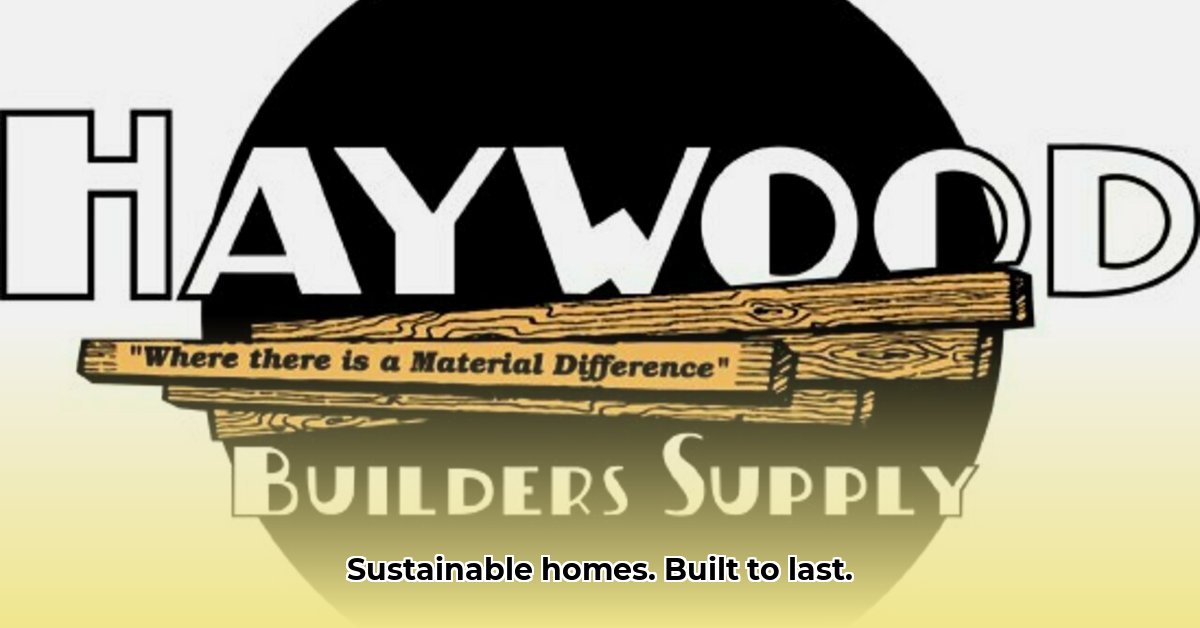
Building a Sustainable Future, Brick by Brick
Haywood Builders, nestled in Waynesville, North Carolina, stands apart from typical construction firms. Established as a family-owned business, it transitioned to an employee-owned cooperative, deeply embedding itself within the Haywood County community. This unique structure fuels a commitment extending beyond profit, prioritizing strong relationships and a thriving local environment. Their long history and active community presence underscore a dedication to environmentally and socially responsible practices, revealing a long-term vision that values people and place above short-term gains. This case study explores how Haywood Builders builds sustainably, not just in materials, but in how they cultivate employee loyalty and engage with their neighbors.
Employee Ownership: A Foundation for Sustainability
A cornerstone of Haywood Builders' success is its employee-owned cooperative structure. This isn't a mere trend; it's fundamental to their identity. This model fosters shared responsibility and ownership, transcending the traditional employer-employee dynamic. Employees aren't simply fulfilling roles; they're invested in the company's overall well-being and long-term prosperity. This translates into significant advantages. How does this impact their environmental performance? Higher employee retention reduces turnover costs, while engaged employees deliver higher quality workmanship and increased attention to detail. Crucially, it fosters a culture of environmental responsibility. Valued employees are more likely to actively seek ways to reduce waste, select eco-friendly materials, and advocate for sustainable practices within the company.
Implicit Sustainability: The Ripple Effect of Community
Haywood Builders’ approach to sustainability isn't about overt displays; it’s a quiet yet powerful commitment woven into their operations. Their people-first philosophy generates a positive environmental ripple effect, even if not always easily quantified. They embody social sustainability – the principle that a thriving business relies on a thriving community. This commitment fosters a culture of environmental responsibility. Happy, engaged employees are more likely to proactively reduce waste, choose sustainable materials, and advocate for responsible building practices. It's a grassroots movement fueled by shared values and a strong sense of community responsibility. Isn't this a powerful model for other businesses to emulate?
Opportunities for Growth: Building on a Strong Foundation
While Haywood Builders has a strong foundation of sustainable practices, continuous improvement is key. A third-party sustainability audit could offer valuable insights. Developing measurable Key Performance Indicators (KPIs) would allow them to track progress and effectively showcase their achievements. Transparency is paramount; customers increasingly seek businesses openly committed to sustainability.
Here are potential areas for growth:
- Formalize a Sustainability Plan: A formal plan, potentially aiming for LEED certification, would provide a structured framework.
- Strengthen Community Partnerships: Collaborating with local environmental organizations could amplify their impact by sharing expertise, resources, and contributing to broader community sustainability initiatives.
- Enhance Public Sustainability Reporting: Regularly publishing sustainability reports would showcase progress, demonstrate commitment, and build stakeholder trust, providing a significant competitive advantage.
Navigating Potential Challenges: A Proactive Approach
Like any business, Haywood Builders faces potential risks. Proactive mitigation is crucial for long-term success and continued dedication to sustainability.
| Risk Category | Risk Description | Likelihood | Impact | Mitigation Strategy |
|---|---|---|---|---|
| Reputational Risk | Failing to meet customer expectations. | Medium | High | Proactive communication & transparency; Continuous improvement; Demonstrating commitment. |
| Financial Risk | Increased costs from sustainable practices. | Low | Medium | Strategic sourcing; Efficient waste management; Exploring government incentives and grants. |
| Operational Risk | Supply chain disruptions. | Medium | Medium | Diversified sourcing; Strong supplier relationships; Inventory management; Contingency planning. |
| Regulatory Risk | Changes in environmental regulations. | Medium | High | Continuous monitoring; Compliance; Proactive engagement with regulatory bodies. |
A Call to Action: Building a Better Future Together
Haywood Builders Waynesville demonstrates how a deep commitment to community and employee well-being translates into a truly sustainable business model. Their approach inspires. By embracing transparency, setting measurable goals, and engaging actively with the community, they can amplify their already considerable impact. Supporting local, sustainable businesses like Haywood Builders represents an investment in a better future for all. Let’s build that future, together.